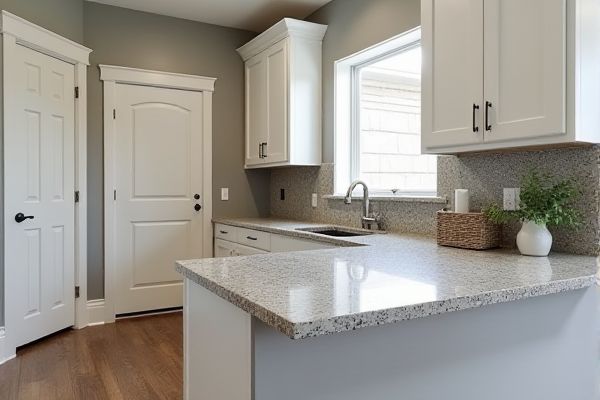
Mudroom quartz countertops offer exceptional durability and low maintenance, resisting stains and scratches better than granite, which requires periodic sealing and care to maintain its natural beauty. Explore the full article to discover which countertop material best suits your mudroom needs and lifestyle.
Table of Comparison
| Feature | Mudroom Quartz Countertop | Mudroom Granite Countertop |
|---|---|---|
| Durability | Highly durable, resistant to scratches and stains | Very durable, but prone to chipping and requires sealing |
| Maintenance | Low maintenance, non-porous, easy to clean | Requires regular sealing, porous surface |
| Appearance | Consistent patterns and colors, modern look | Unique natural patterns, traditional look |
| Cost | Moderate to high cost | Moderate to high cost, varies by rarity |
| Heat Resistance | Moderate heat resistance, can be damaged by high heat | High heat resistance, suitable for hot items |
| Stain Resistance | Excellent stain resistance due to non-porous surface | Susceptible to stains if not sealed properly |
| Installation | Lightweight, easier installation | Heavier, requires professional installation |
| Environmental Impact | Manufactured material, lower environmental footprint | Natural stone, quarrying impacts environment |
Introduction to Mudroom Countertop Materials
Mudroom quartz countertops offer exceptional durability and resistance to stains, making them ideal for high-traffic areas prone to dirt and moisture. Granite countertops provide a natural stone surface with unique patterns and robust strength but require periodic sealing to maintain their resistance to spills and scratches. Choosing between quartz and granite for a mudroom countertop depends on the desired balance between maintenance needs and aesthetic appeal.
Quartz Countertops: Features and Benefits
Quartz countertops in mudrooms offer exceptional durability and resistance to stains and scratches, making them ideal for high-traffic areas. Engineered from natural quartz minerals combined with resin, they provide a non-porous surface that resists moisture and bacteria, enhancing hygiene. Available in a wide range of colors and patterns, quartz countertops also deliver low maintenance without the need for regular sealing, unlike granite options.
Granite Countertops: Features and Benefits
Granite countertops offer exceptional durability and resistance to scratches, heat, and stains, making them ideal for high-traffic mudrooms. Their natural mineral composition provides a unique, elegant appearance with a variety of color options to complement your mudroom design. Choosing granite enhances your space's value while ensuring long-lasting performance and low maintenance.
Durability Comparison: Quartz vs. Granite
Quartz countertops offer exceptional durability due to their engineered composition, making them highly resistant to scratches, stains, and heat, ideal for high-traffic mudroom environments. Granite countertops, while naturally durable and heat-resistant, can be more susceptible to chipping and require regular sealing to maintain stain resistance. Both materials provide strong longevity, but quartz's low maintenance and increased scratch resistance make it a superior choice for mudroom durability.
Maintenance and Cleaning Requirements
Mudroom quartz countertops require minimal maintenance, as they are non-porous and resistant to staining, making cleaning with mild soap and water sufficient. Granite countertops in mudrooms need periodic sealing to prevent absorption of moisture and stains, and cleaning involves using stone-specific cleaners or mild detergent. Quartz offers a more durable, low-maintenance option, whereas granite demands regular upkeep to maintain its appearance in high-traffic mudroom areas.
Aesthetic Appeal and Design Options
Quartz countertops in mudrooms offer a wide range of colors and patterns, providing a consistent and modern aesthetic that resists stains and scratches. Granite countertops showcase natural stone variations with unique veining and color depth, adding a timeless and luxurious appeal to your space. Your choice depends on whether you prefer the engineered elegance of quartz or the organic beauty of granite for design versatility.
Cost Analysis: Quartz vs. Granite
Quartz countertops typically cost between $70 and $100 per square foot, while granite ranges from $50 to $80 per square foot, making granite generally more budget-friendly upfront. Quartz's price reflects its durability and low maintenance, as it resists stains and scratches better, potentially lowering long-term costs for your mudroom. Considering both the initial investment and lifecycle value helps you decide which countertop material offers the best cost efficiency for your space.
Stain and Scratch Resistance
Mudroom quartz countertops offer excellent stain resistance due to their non-porous surface, making them ideal for handling dirt and spills without absorbing stains. Granite countertops provide strong scratch resistance but require regular sealing to maintain their stain-resistant properties over time. Your choice should consider the low-maintenance advantage of quartz if durability against stains is a top priority in your mudroom.
Environmental Impact and Sustainability
Quartz countertops often contain engineered materials and resins, resulting in higher energy consumption and emissions during production compared to natural granite. Granite is a natural stone that typically requires less processing, contributing to a lower carbon footprint and greater sustainability. Choosing granite for mudroom countertops supports environmental efforts by utilizing durable, long-lasting materials with minimal chemical additives.
Choosing the Best Countertop for Your Mudroom
Mudroom quartz countertops offer superior durability, stain resistance, and low maintenance compared to granite, making them ideal for high-traffic areas prone to dirt and moisture. Granite countertops provide a unique natural aesthetic with heat resistance and scratch resistance but require regular sealing to maintain their appearance. Selecting between quartz and granite depends on balancing the need for longevity, ease of upkeep, and style preferences specific to your mudroom's usage.
 homyna.com
homyna.com